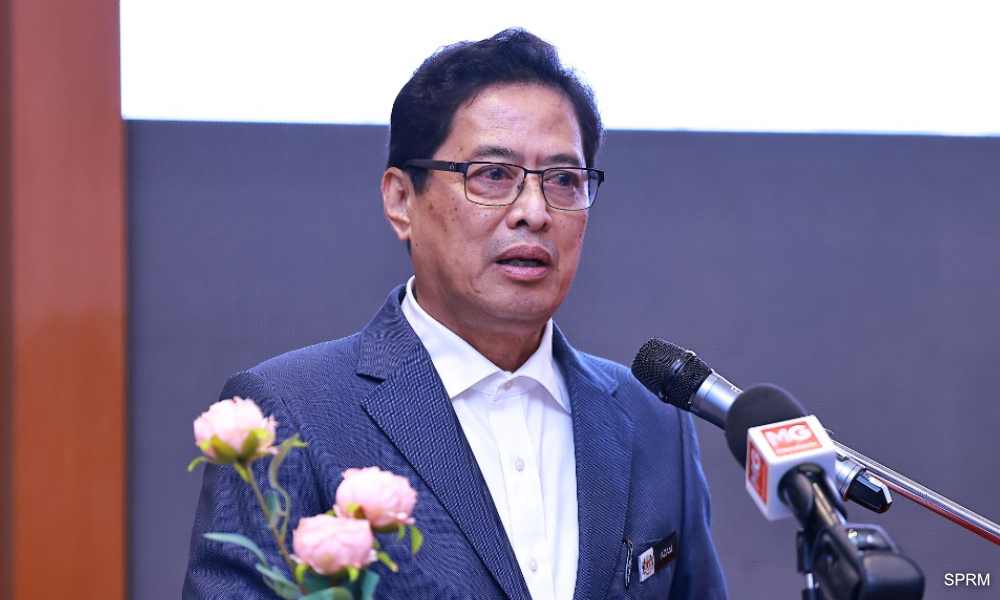


Mariam Mokhtar
Published: Jul 5, 2025 9:00 AM
Updated: 11:00 AM
COMMENT | The Madani administration’s nightmare is just about to begin.
Leaving the top post of chief justice (CJ) empty without a designated successor on the day the much-respected former CJ, Tengku Maimun Tuan Mat, retired is unacceptable.
Her retirement date was not a secret. It has been known for years.
We may never know the real reason why Prime Minister Anwar Ibrahim failed to extend her tenure, but he and his aides have not at all considered the wide-ranging consequences of their actions.
What this saga has done is to paint a more negative picture of him and his administration. Sadly, the reputation of the judiciary will also be dragged down.
Anwar’s inaction has also highlighted a lack of leadership, signalled to the rakyat an institutional breakdown and reflected poor management practices.
This will only lead to a further loss of trust and erosion of confidence in the coalition government and a decline in our faith in the judiciary.
Only an irresponsible leader will think that the power vacuum in the judiciary is not dangerous.
Fearless, balanced, fair
More’s the pity, especially as Tengku Maimun has, through her own stellar leadership in the past six years, managed to restore our trust and confidence in the judiciary. She was fearless, balanced and fair in her judgments.
Tengku Maimun, who was appointed Malaysia’s first female CJ in 2018, has been described by Universiti Malaya’s Prof Emeritus Shad Saleem Faruqi as “transformative” with her independence and landmark judgments.
Published: Jul 5, 2025 9:00 AM
Updated: 11:00 AM
COMMENT | The Madani administration’s nightmare is just about to begin.
Leaving the top post of chief justice (CJ) empty without a designated successor on the day the much-respected former CJ, Tengku Maimun Tuan Mat, retired is unacceptable.
Her retirement date was not a secret. It has been known for years.
We may never know the real reason why Prime Minister Anwar Ibrahim failed to extend her tenure, but he and his aides have not at all considered the wide-ranging consequences of their actions.
What this saga has done is to paint a more negative picture of him and his administration. Sadly, the reputation of the judiciary will also be dragged down.
Anwar’s inaction has also highlighted a lack of leadership, signalled to the rakyat an institutional breakdown and reflected poor management practices.
This will only lead to a further loss of trust and erosion of confidence in the coalition government and a decline in our faith in the judiciary.
Only an irresponsible leader will think that the power vacuum in the judiciary is not dangerous.
Fearless, balanced, fair
More’s the pity, especially as Tengku Maimun has, through her own stellar leadership in the past six years, managed to restore our trust and confidence in the judiciary. She was fearless, balanced and fair in her judgments.
Tengku Maimun, who was appointed Malaysia’s first female CJ in 2018, has been described by Universiti Malaya’s Prof Emeritus Shad Saleem Faruqi as “transformative” with her independence and landmark judgments.

PM Anwar Ibrahim arriving in Rome, Italy for an official visit
Anwar may have thought that he had avoided the rakyat’s opprobrium because he had to attend to matters of state, on his official visit to Italy, France, and Brazil.
But as his visit coincided with Tengku Maimun’s official day of retirement, his absence was all the more jarring and only fuelled further speculation.
We may recall that the convicted felon, Najib Abdul Razak, would also plan overseas trips to avoid various crises at home.
Nevertheless, Anwar’s failure to extend Tengku Maimun’s contract by six months, which incidentally is stipulated under Article 125(1) of the Constitution, was highly irresponsible.
On the defensive
Stung by the criticisms, Anwar went into defensive mode and accused his critics of politicising the appointment of judges. He even had the brass neck to claim that the prime minister plays no part in judicial appointments.
He said, “... regarding civil servants, or judges, when any official reaches their retirement age, there is a procedure in place. One does not get their tenure extended automatically upon retirement.”
Anwar may have thought that he had avoided the rakyat’s opprobrium because he had to attend to matters of state, on his official visit to Italy, France, and Brazil.
But as his visit coincided with Tengku Maimun’s official day of retirement, his absence was all the more jarring and only fuelled further speculation.
We may recall that the convicted felon, Najib Abdul Razak, would also plan overseas trips to avoid various crises at home.
Nevertheless, Anwar’s failure to extend Tengku Maimun’s contract by six months, which incidentally is stipulated under Article 125(1) of the Constitution, was highly irresponsible.
On the defensive
Stung by the criticisms, Anwar went into defensive mode and accused his critics of politicising the appointment of judges. He even had the brass neck to claim that the prime minister plays no part in judicial appointments.
He said, “... regarding civil servants, or judges, when any official reaches their retirement age, there is a procedure in place. One does not get their tenure extended automatically upon retirement.”

MACC chief commission Azam Baki
He failed to explain how the MACC chief’s tenure was extended thrice.
It is disingenuous of Anwar to claim that the PM has nothing to do with judicial appointments. Of the nine members of the Judicial Appointments Commission (JAC), five members are the PM’s appointees.
Of the five, one is a Federal Court judge, whilst the remaining four non-judges are selected after prior consultation with the Malaysian Bar, the Sabah Law Association, the Advocates Association of Sarawak, the attorney-general of the Federation, and the attorney-general of a state legal service.
None are from the executive or public service.
It is clear that the PM’s five appointees have the majority and decisive vote, and can exert considerable influence in recommending who becomes a judge.
Just imagine these appointments as a version of Najib’s “You help me, I help you” axiom. It is something we know that happens in everyday life. A boss and an employee. A benefactor and beneficiary. The politician and his constituency. A lecturer and his pupil.
Think power, position, perks and promotion. Why bite the hand that feeds you?
Why not extend Tengku Maimun’s tenure?
It is disingenuous of Anwar to claim that the PM has nothing to do with judicial appointments. Of the nine members of the Judicial Appointments Commission (JAC), five members are the PM’s appointees.
Of the five, one is a Federal Court judge, whilst the remaining four non-judges are selected after prior consultation with the Malaysian Bar, the Sabah Law Association, the Advocates Association of Sarawak, the attorney-general of the Federation, and the attorney-general of a state legal service.
None are from the executive or public service.
It is clear that the PM’s five appointees have the majority and decisive vote, and can exert considerable influence in recommending who becomes a judge.
Just imagine these appointments as a version of Najib’s “You help me, I help you” axiom. It is something we know that happens in everyday life. A boss and an employee. A benefactor and beneficiary. The politician and his constituency. A lecturer and his pupil.
Think power, position, perks and promotion. Why bite the hand that feeds you?
Why not extend Tengku Maimun’s tenure?

Acting Chief Justice Hasnah Hashim
Two days after the former CJ’s retirement, the chief registrar of the Federal Court announced that the Chief Judge of Malaya, Hasnah Hashim, would temporarily serve as the chief justice until the vacancy was filled.
Why overload her work with both the powers of the CJ and her own? This preposterous decision appears as if it were a knee-jerk reaction to our criticisms.
It would have made perfect sense to allow Tengku Maimun to continue for another six months without disrupting both women’s roles and the smooth functioning of the courts.
In the judicial/constitutional crisis of 1988, the judiciary was emasculated by the erstwhile prime minister Dr Mahathir Mohamad.
After an internal Umno dispute about election rigging in 1987, High Court judge Harun Hashim declared Umno “an unlawful society”.
A livid Mahathir sought revenge, with the forced suspension and removal of the Lord President of the Supreme Court, Salleh Abas, and two other senior judges.
In the second scandal, 19 years later, the VK Lingam video clips showed how Malaysian justice was sold to the highest bidder.
The nation was in turmoil, and a royal commission of Inquiry was set up. In 2009, the Malaysian Bar proposed the formation of the JAC to vet judicial candidates.
These judicial scandals sent shock waves throughout Malaysia and the world.
Two days after the former CJ’s retirement, the chief registrar of the Federal Court announced that the Chief Judge of Malaya, Hasnah Hashim, would temporarily serve as the chief justice until the vacancy was filled.
Why overload her work with both the powers of the CJ and her own? This preposterous decision appears as if it were a knee-jerk reaction to our criticisms.
It would have made perfect sense to allow Tengku Maimun to continue for another six months without disrupting both women’s roles and the smooth functioning of the courts.
In the judicial/constitutional crisis of 1988, the judiciary was emasculated by the erstwhile prime minister Dr Mahathir Mohamad.
After an internal Umno dispute about election rigging in 1987, High Court judge Harun Hashim declared Umno “an unlawful society”.
A livid Mahathir sought revenge, with the forced suspension and removal of the Lord President of the Supreme Court, Salleh Abas, and two other senior judges.
In the second scandal, 19 years later, the VK Lingam video clips showed how Malaysian justice was sold to the highest bidder.
The nation was in turmoil, and a royal commission of Inquiry was set up. In 2009, the Malaysian Bar proposed the formation of the JAC to vet judicial candidates.
These judicial scandals sent shock waves throughout Malaysia and the world.

Last March, Tengku Maimun spoke at the 24th Commonwealth Law Conference in Malta and urged the removal of the role of the PM in the appointment of judges.
Removing the PM’s role had also been echoed three years earlier by Negeri Sembilan Yang di-Pertuan Besar Tuanku Muhriz Tuanku Munawir.
Malaysians desperately yearn for judicial independence and constitutional supremacy, but as recent events have shown, are we at risk of another judicial crisis?
MARIAM MOKHTAR is a defender of the truth, the admiral-general of the Green Bean Army, and the president of the Perak Liberation Organisation (PLO). Blog, X.

Root cause is because Anwar Madani is a willing prisoner of UMNO.
ReplyDeleteWrong. Root cause is because free him from. Bamboo River.
Delete